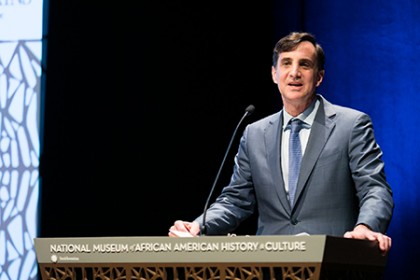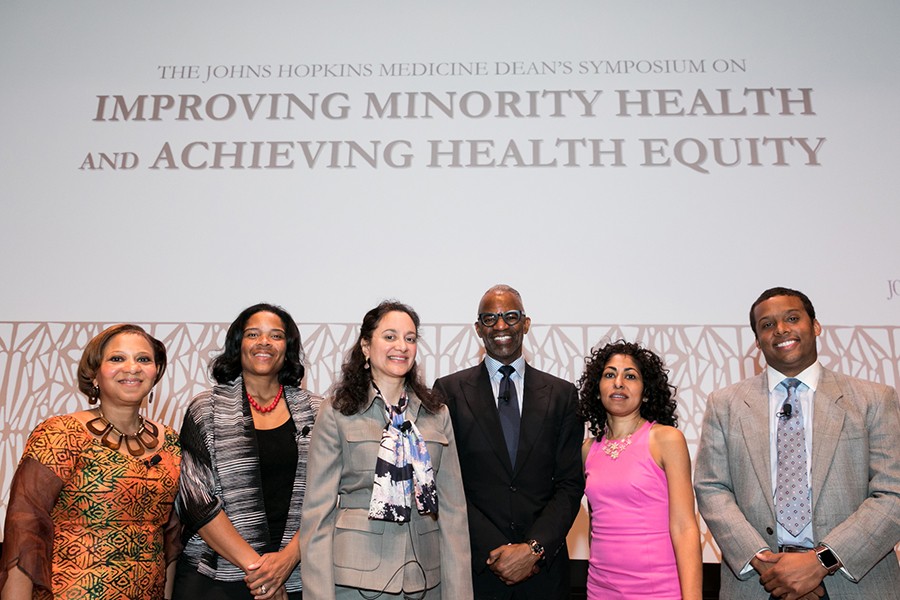In 1985, the U.S. Department of Health and Human Services issued a comprehensive report intended to mark the beginning of the end of yawning health disparities between minority and majority groups throughout the country.
But three decades later, "the statistics remain damning, and, indeed, disheartening," said Johns Hopkins University President Ronald. J. Daniels during his remarks at the Johns Hopkins Medicine Dean's Symposium on Improving Minority Health and Achieving Health Equity.
"At Johns Hopkins," Daniels added, "it is our professional—and, indeed, our moral—obligation to ask these difficult questions of ourselves and others and to work toward solutions."

Image caption: JHU President Ronald J. Daniels
Image credit: Geoff Chesman | Image Link Photo
Co-hosted by Johns Hopkins Medicine and the Smithsonian National Museum of African American History and Culture in Washington, D.C., the April 12 event at the museum brought together experts from across the Hopkins Medicine spectrum to address how the institution is working toward solutions to these issues through collaboration and excellence in research, education, clinical care, and community engagement.
"We certainly don't have all the answers," said Paul B. Rothman, chief executive officer of Johns Hopkins Medicine, "but until you ask the questions, you can't have the answers. And we're asking the questions."
Hopkins alum and university trustee N. Anthony Coles introduced the evening's panel by sharing his personal experience of having loved ones without access to quality health care, and his fears that "a cough becomes pneumonia, high blood pressure becomes a stroke, that some other ailment may befall them and take them away from this world because they don't have access to the right resources."
Access, however, is just one part of the health care-disparities puzzle, explained panelist Lisa Cooper, vice president of health care equity for Hopkins Medicine.
"We are testing comprehensive interventions—working not just with individuals, but health systems and community partners who deliver services, to target multiple levels of this problem," she said.
Integral to the Hopkins approach, Cooper said, is a Community Advisory Board.
"We work with this board to ask them: What questions should we be asking? What materials should we use?," she said. "And when we have results, how can we communicate them so that the recommendations are actually followed?"
Other panelists highlighted pilot programs Hopkins currently leads in Baltimore and Washington. Deidra Crews, vice chair of diversity and inclusion for the Department of Medicine, is studying a "virtual supermarket" program to determine if its method of delivering healthy foods improves outcomes for African-Americans with hypertension and kidney disease in Baltimore food deserts. Akila Viswanathan, executive vice chair of radiation oncology at Sibley Memorial Hospital, spoke about a Hopkins/United Medical Center partnership that helps women with gynecological cancers in Washington's Wards 7 and 8—predominantly low-income districts—better connect with the right providers, including those at Sibley.
"We need to provide better screening and education, and ensure more women in this population have vaccines that prevent the virus that causes cervical cancer, HPV," Viswanathan said. "It's difficult for many in this population to receive that care because they don't have referrals, or they have transportation issues."
Dina Lansey, an assistant director for diversity and inclusion for the Sidney Kimmel Comprehensive Cancer Center, noted that Hopkins is increasing its emphasis on recruiting diverse participants for clinical trials to account for differences in outcomes such as side effects and survival rates.
"Sometimes groups are excluded even if they wanted to be in a trial," Lansey said. "That widens a difference that we should be able to do something about; it's a difference that shouldn't exist."
Yet the most important tool to leverage in eliminating health disparities may be increasing diversity among those delivering the care: aspiring doctors, like Zachary Obinna Enumah, a fourth-year Hopkins medical student who has received several scholarships, including the Henry M. Seidel, M.D., Scholarship and the James F. Nabwangu, M.D., Scholarship.
"Diversity in appearance leads to diversity in experience," Enumah said. "If you want to elevate the emotional intelligence of students, residents, and faculty, it's important to bring that diversity to the classroom, because we will bring that to the clinic."
Posted in Health, University News
Tagged health disparities








